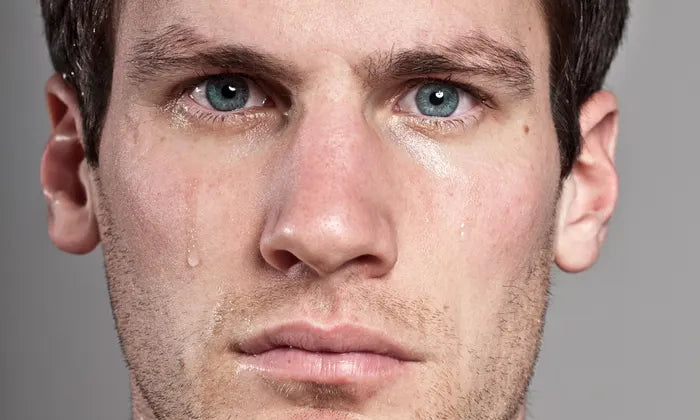
In a world where traditional gender roles have often dictated the behavior and emotions deemed acceptable for men, the question of whether guys cry has been a topic of considerable debate. Society has long perpetuated the notion that real men don't cry, reinforcing a harmful stereotype that equates emotional expression with weakness. However, as societal norms evolve and conversations surrounding mental health gain prominence, it's crucial to delve into the emotional landscape of men and explore the complexities of vulnerability.
Breaking the Myth: Men Do Cry
Contrary to the stoic image that has been ingrained in cultural narratives, men do cry. The misconception that men are emotionless beings is not only inaccurate but also detrimental to their mental well-being. Crying is a natural and healthy emotional release, irrespective of gender. Research has shown that crying can have therapeutic benefits, helping individuals process and cope with intense emotions.
Cultural and Societal Influences on Male Emotional Expression
The reluctance of men to express their emotions openly can be traced back to cultural and societal expectations. From an early age, boys are often told not to cry, to be tough, and to suppress their feelings. These ingrained expectations contribute to the development of a façade of emotional resilience that may hinder authentic self-expression. Understanding and dismantling these societal pressures is crucial in creating a more inclusive and emotionally intelligent society.
The Mask of Masculinity: Breaking Down Barriers
The concept of the "mask of masculinity," as coined by sociologist Michael Kimmel, refers to the societal expectations that compel men to conform to a narrow definition of manhood. This mask discourages vulnerability and emotional expression, pushing men to adopt a tough exterior even in moments of distress. Unmasking these expectations is a vital step in allowing men the freedom to express their emotions genuinely.
Embracing Emotional Intelligence in Men
Emotional intelligence involves recognizing, understanding, and managing one's own emotions, as well as being attuned to the emotions of others. Fostering emotional intelligence in men is essential for personal growth and building healthier relationships. By acknowledging and embracing a wide range of emotions, men can cultivate a deeper understanding of themselves and develop stronger connections with those around them.
The Impact of Suppressed Emotions on Mental Health
The suppression of emotions, including tears, can have detrimental effects on mental health. Men who adhere rigidly to societal expectations of emotional restraint may find it challenging to navigate and cope with life's challenges. Unexpressed emotions can lead to stress, anxiety, and even depression. Recognizing the importance of emotional release, including crying, is a crucial aspect of maintaining mental well-being.
Real-life Stories: Men Sharing Their Tears
To humanize the discussion, it's essential to share real-life stories of men who have embraced vulnerability and expressed their emotions. These stories serve as powerful examples of breaking free from societal expectations and finding strength in openness. Whether it's discussing personal struggles, losses, or moments of profound joy, these narratives challenge the notion that tears equate to weakness.
Changing Narratives: Influential Figures Opening Up
In recent years, there has been a notable shift in the way influential figures, including celebrities, athletes, and political leaders, approach and discuss their emotions. Public figures such as Prince Harry, Dwayne "The Rock" Johnson, and former President Barack Obama have openly shared their experiences with vulnerability and have encouraged others to do the same. This shift is instrumental in challenging stereotypes and normalizing emotional expression for men.
Encouraging Emotional Support Networks
Creating a culture that encourages emotional expression in men involves establishing supportive networks. Friends, family, and romantic partners play crucial roles in fostering an environment where men feel safe to share their emotions. By building these support networks, men can develop a sense of belonging and assurance that their vulnerabilities will be met with empathy rather than judgment.
Educating the Next Generation: Rethinking Masculinity
An essential aspect of changing the narrative around men and emotions involves re-educating the next generation. Schools, parents, and communities must challenge outdated notions of masculinity and promote emotional literacy from an early age. Teaching boys that it's okay to cry, express their feelings, and seek help when needed is an investment in a future generation that values authenticity and emotional well-being.
Final Words: Redefining Strength Through Emotional Expression
In conclusion, the question of whether guys cry is not a matter of debate; it's a fundamental aspect of being human. The stigma surrounding male emotional expression is a construct that society has imposed for far too long. True strength lies not in stoicism but in the ability to embrace vulnerability, express emotions authentically, and seek support when needed.
As we continue to challenge stereotypes and redefine masculinity, it's crucial to recognize that men, like anyone else, experience a spectrum of emotions. Crying is not a sign of weakness but a testament to one's capacity for empathy, compassion, and resilience. By breaking down the barriers that restrict emotional expression, we pave the way for a more inclusive and emotionally intelligent society, where individuals of all genders can thrive authentically.
